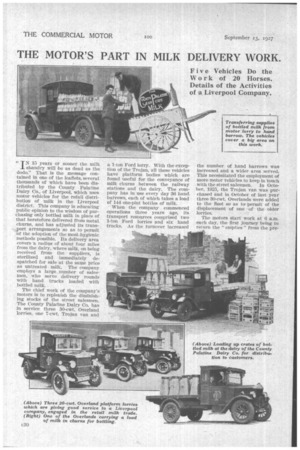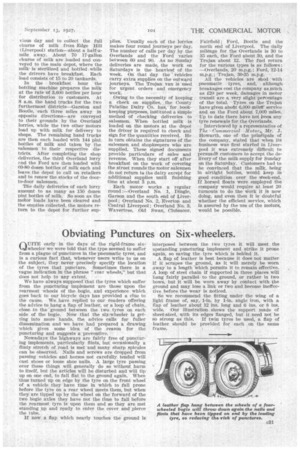THE MOTOR'S PART IN MILK DELIVERY WORK.
Page 52

Page 53

If you've noticed an error in this article please click here to report it so we can fix it.
F iv e Vehicles Do the Work of 20 Horses, Details of the Activities of a Liverpool Company,
" IN15years or sooner the milk shandry will be as dead as the dodo." That is the message contained in one of the leaflets, several thousands of which have been distributed by the County Palatine Dairy co., of Liverpool, which uses motor vehicles for the retail distribution of milk in the Liverpool district. This company is educating public opinion to the wisdom of purchasing only bottled milk in place of that heretofore delivered from metal churns, and has adjusted its transport arrangements so as to permit of the adoption of the most hygienic methods possible. Its delivery area covers n radius of about four miles from the dairy, where milk, on being received from the suppliers, is sterilized and immediately despatched for sale at the same price as untreated milk. The . company employs a large number of salesmen, who serve delivery rounds with hand trucks loaded with bottled milk.
The chief work of the company's motors is to replenish the diminishing stocks of the street salesmen. The County Palatine Dairy Co. has in service three 30-cwt. Overland lorries, one 7-cwt. Trojan van and a 1-ton Ford lorry. With the exception of the Trojan, all these vehicles have platform bodies which are found useful for the conveyance of milk churns between the railway stations and the dairy. The company has in use every day 36 hand. barrows, each of which takes a load of .144 one-pint bottles of milk.
When the company commenced operations three years ago, its transport resources comprised two 1-ton Ford lorries and six hand trucks. As the turnover increased the number of hand barrows was increased and a wider area served. This necessitated the employment of more motor vehicles to keep in touch with the street salesmen. In October, 1925, the Trojan van was purchased and in October of last year three 30-cwt. Overloads were added to the fleet so as to permit of the displacement of one of the older lorries.
The motors start work at 6 a.m. each day, the first journey being to return the " empties " from the pre vious day and to collect the full churns of milk from Edge Hill (Liverpool) station--about a half-a
mile away. About 70 17-gallon churns of milk are loaded and Con veyed to the main depot, where the milkis sterilized and bottled while the drivers have breakfast. Each load consists of 15 to 20 tankards.
In the breakfast hour the bottling machine prepares the milk at the rate of 3,600 bottles per hour for distribution to customers. At 8 a.m. the hand trucks for the two furthermost districts--Garston and Bootle, -each three miles away in opposite directions—are conveyed to their grounds by the Overland lorries, while the two other motors load up with milk for delivery to shops. The remaining hand trucks are then each loaded with 144 pint bottles of milk and taken by the salesmen to their respective districts. After completing the shop deliveries, the third Overland lorry and the Ford are then loaded with 60-80 dozen bottles of milk each and leave the depot to call on retailers and to renew the stocks of the doorto-door salesmen.
The daily deliveries of each lorry amount to as many as 150 dozen pint bottles of milk. So soon as the motor loads have been cleared and the empties collected, the motors return to the depot for further sup
plies. Usually each of the lorries makes four round journeys per day. The number of calls per day by the Overlands and the Ford varies between 60 and 90. As no Sunday deliveries are made, the work on Saturdays is the heaviest of the week. On that day the Vehicles carry extra supplies on the outward journeys. The Trojan van is used for urgent orders and emergency work.
Owing to the necessity of keeping a check on supplies, the County Palatine Dairy Co. bas, for bookkeeping purposes, instituted a simple method of checking deliveries to salesmen. When bottled milk is loaded on the motors at the depot the driver is required to check and sign for the quantities received. He in turn obtains tile signatures of the salesmen and shopkeepers who are supplied. These signed documents provide particulars of sales and revenue. When they start off after breakfast on the work of covering the street romirls the motor salesmen do not return to the dairy except for additional supplies until finishing time at about 3 p.m.
Each motor works a regular round ;—Overland No. 1, Dingle, Garson and the south end of Liverpool; Overland No. 2, Everton and Central Liverpool; Overland No. 3, Wavertree, Old Swan, Clubmoor,
Fairfield; Ford, Bootle and the north end of Liverpool. The daily mileage for the Overlands is 30 to 35 each, the Ford about 30, and the Trojan about 12. The fuel return for the various types is as follows : —Overlands, 20 m.p.g. ; Ford, 12-14 in,p.g.; Trojan, 30-35 m.p.g.
All the vehicles are shod with pnemnatie tyres, and, although breakages cost the company as much as 120 per week, damages in motor transit are a very slight percentage of the total. Tyres on the Trojan have given abotit 6,000 mileS' service and On the Ford about 7,000 miles. Up to date there have not 'seen any tyre renewals for the Overlands.
Interviewed by a representative of Tile Commercial Motor, Mr. J. Howarth, one of the prinCipais of the company, stated that when its business was first started in Liverpool it was extremely difficult to persuade customers to accept the delivery of the milk supply for Sunday on the Saturday. Customers had to be convinced that the milk, being in airtight bottles, would keep in good condition over the week-end. If horsed floats were employed the company would require at least 20 turnouts to do the -Work it is now doing, and even then it is doubtful whether the efficient service, which is assured by the use of the motors, would be possible.












































































































